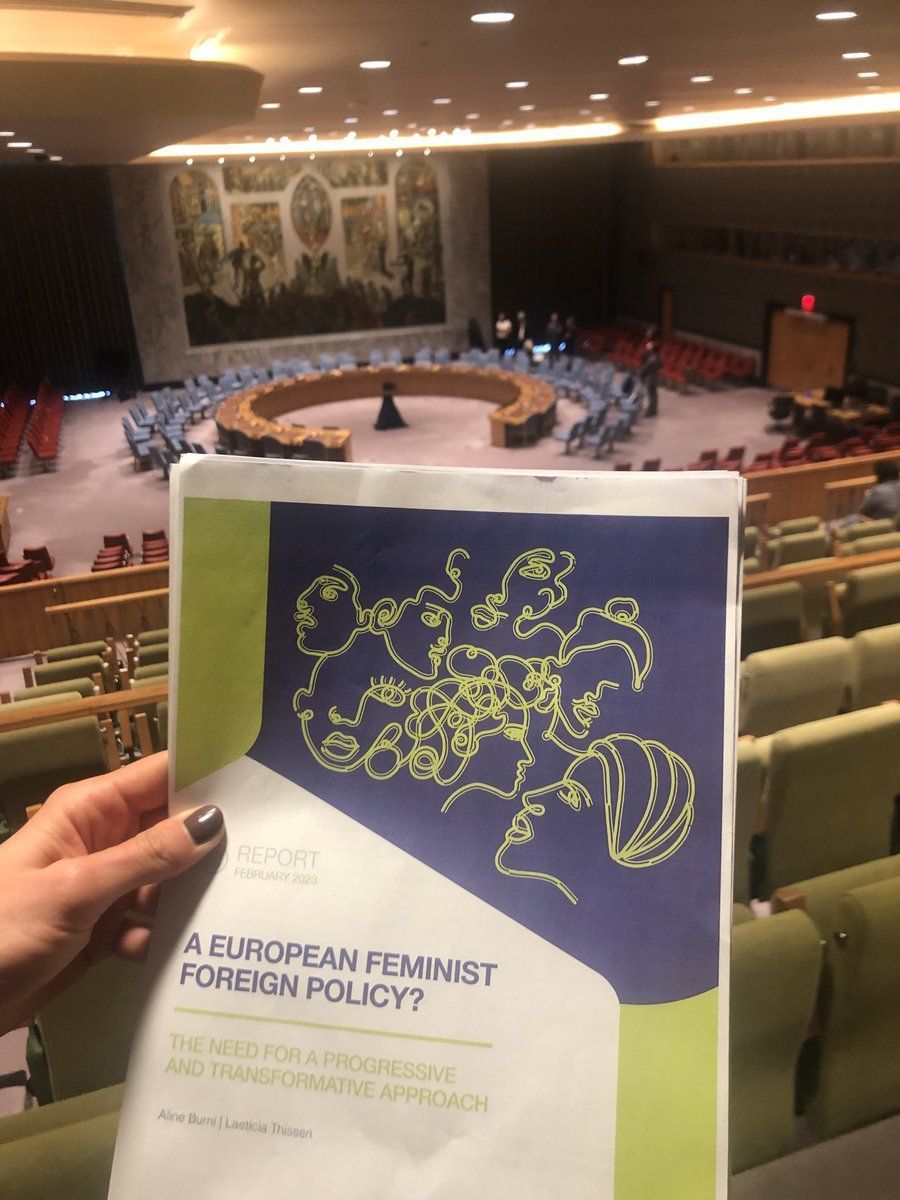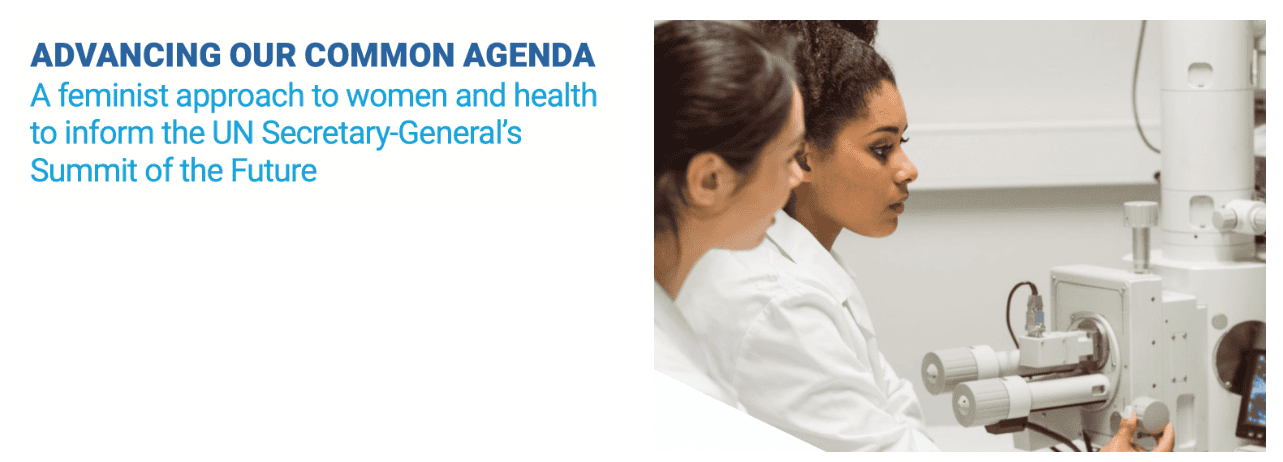Feminist Framework for “Our Common Agenda”

Share
The Our Common Agenda report is a comprehensive policy framework adopted by the United Nations which overall aims to promote gender equality and the empowerment of women as essential for achieving a more just and peaceful world. The main objectives related to promoting the gender equality agenda are the following:
- Advance the rights of women and girls: The report aims to promote and protect the rights of women and girls, including their right to education, health, and equality before the law.
- Promote gender equality: The report aims to eliminate all forms of discrimination against women and girls, and to ensure that men and women have equal opportunities in all spheres of life.
- Empower women and girls: The report aims to strengthen the leadership and political participation of women, as well as their economic empowerment.
- Enhance the well-being of women and girls: The report aims to improve the health, safety, and well-being of women and girls, including by addressing issues such as violence against women and reproductive health.
- Enhance the role of women in peace and security: The report aims to increase the participation and leadership of women in peace and security processes, including in conflict prevention, resolution, and reconstruction.
GWL Voices, in partnership with the Coalition for the UN We Need, has launched a call for policy briefs focused on the feminist perspective in the “Our Common Agenda” report. This document provides commentary on the submissions received in relation to the stated objectives.

This policy brief elaborates on objective to empower women within the global governance system. Gender equality is not possible without women's leadership and participation in multilateral spaces, such as the United Nations, which have historically been dominated by men.
The UN has played a significant role in promoting gender equality through various policies and initiatives, such as the Beijing Declaration and Platform for Action, UN Security Council Resolution 1325, the UN Global Compact, and the Sustainable Development Goals. The current Secretary-General of the UN, António Guterres, has made commitments to placing women and girls at the center of global cooperation in the Our Common Agenda report.
However, simply increasing the number of women in decision-making roles is not enough to achieve gender equality. Systems of oppression must also be addressed. Women's and girls' rights are currently under threat globally, with issues such as lack of access to abortion and gender-based violence being major concerns.
This policy brief sees increasing women's representation and participation as a first step in the long-term project of global governance reform toward a more feminist and rights-based value system. Increasing diversity in representation and participation is important for informed and nuanced policymaking, as it brings a range of lived experiences to decision-making. At its core, this policy brief stands on the need to work towards gender equality and the protection of women's and girls' rights to create a more just and equal society which is a main objective of the Our Common Agenda report.
Author: Marissa Conway

The paper discusses the importance of enhancing the well-being of women and girls, which is a key objective of Our Common Agenda related to gender equality. It highlights several issues faced by women in achieving their right to health, including post-COVID syndrome, secondary health impacts, and reduced access to sexual and reproductive health care services. In general, women tend to live longer than men, but they spend more of their lives in poor health. Non-communicable diseases such as cardiovascular disease, respiratory disease, diabetes, and cancer are the major causes of death in women, including premature death. Health status is influenced by a combination of biology and social determinants, including economic, commercial, and legal policies and institutions that shape social environments. However, the relationship between health determinants and health status is hindered by uncoordinated systems of accountability that exist within silos and lack coherence across sectors.
Women make up 67% of all health and social care workers, but only 25% of leadership positions. Women are underrepresented in clinical trials, and data on women's health is often incomplete and inadequate. The health workforce needs to be more diverse, inclusive, and gender-sensitive to better address the needs of the population. The report establishes the link between solving these women's public health problems and the implementation of Our Common Agenda, particularly in terms of their right to health, decent work and participation, and the right to a healthy environment, which was emphasized in the UNGA resolution in July of 2022.
To improve the situation of women's rights, political and ideological shifts are needed, such as promoting the right to universal health care that includes sexual and reproductive services. Environmental shifts are also necessary, as gender inequity is embedded in the status quo of institutions. Knowledge shifts are needed so that a gender lens is incorporated into health policy and practice.
Authors: Sarah Hawkes, Kent Buse

The paper focuses on enhancing the role of women in peace and security, a key objective of Our Common Agenda related to gender equality.
The paper summarizes the WPS framework and its current situation as part of the New Agenda for Peace. It employs relevant UN sources to inform the reader about the WPS agenda's progress, for example, by mentioning that there are currently ten UN Security Council Resolutions to execute the WPS agenda or that there is a Gender Advisor and/or Gender Officer at all UN peacekeeping and political missions, and UN agencies have gender advisors in the field and Women Protection Advisors focusing on conflict-related sexual violence.
Additionally, the paper discusses the National Action Plans as one of the greatest contributions to the progress of the WPS, and it also highlights the emergence of feminist foreign policy and other efforts such as the Elsie Initiative for Women in Peace Operations or the assessment of opportunities for women in peace operations (MOWIP), in which some countries, such as Canada, Germany, and Mexico, have been involved.
Author: Corey Levine

Authors: Aline Burni, Laeticia Thissen

This policy brief explains how digital systems are embedded within complex imperial structures and are created through imperial rivalries. It also explains that the tech industry often portrays certain individuals, particularly those from the Global South, as being outside the tech world. Digital colonialism is rooted in the design of a tech ecosystem for the purpose of profit and exploitation, extracting data from the streams of information that people share as they go online and connect through apps. Digital systems can also reinforce forces such as patriarchy, racial and ethnic bias, paternalism, heteronormativity, classism and class privilege, caste privilege, ableism, and ageism. Governments are attempting to limit the power of tech companies, and tech firms are working to incorporate tech ethics into their practices, but there has been controversy and accusations of ethics washing. The author argues that digital democratization is flawed because it assumes that everyone has a personal internet connection and social media account, and therefore can create content and engage online, but this is not the case for many diverse communities. Therefore, they propose decolonial, feminist approaches to digital ethics and governance that take into account the intersectional identities and experiences of marginalized communities.
The policy brief makes a strong argument that a decolonial approach to ethical and governance practices in digital systems can have a positive, long-term impact on marginalized populations, rather than just helping them survive in the short term. Its connection to Our Common Agenda would be that the development and use of digital systems should be guided by ethical principles and considerations and should evaluate the potential impacts on individuals and society as a whole. Ensuring that the benefits of these technologies are shared fairly and equitably, and that they do not perpetuate or exacerbate existing inequalities or injustices, will be crucial to realizing their full potential and aligning with the goals of "Our Common Agenda" and the SDGs. However, the connection with OCA needs to be made more explicit in this document, as it is quite different from what is presented in other policy briefs.
Author: Aarathi Krishnan

Author: Fatema Khafagy

This policy brief focuses on the issue of gender-responsive, sustainable, and youth-focused funding and resourcing, which has been a concern for feminist and youth stakeholders and has not been adequately addressed at the UN. It includes a different perspective on how the fight for gender equality can be underpinned by involving youth. The author has put their activist experience into trying to solve the problems they have been exposed to and emphasizes their use of UN outcomes such as the Beijing declarations, CEDAW, Agenda 2030, and the 2030 UN Youth Strategy, as well as experiences in the Generation Equality Youth forum and the elaboration of the Young Feminist Manifesto.
According to the author, the Our Common Agenda is designed to accelerate the implementation of existing agreements, including the Sustainable Development Goals, and includes proposals on topics such as a renewed social contract with a focus on inclusion, participation, and protection; solidarity with younger generations and youth leadership; and multilateralism with an increased role for the private sector.
The author identifies that representation, participation, and engagement of youth, women, and girls is a priority in the agenda, but a lack of resources and funding often hinders their active, meaningful participation. Moreover, the Secretary General’s vision for meaningful, diverse, and effective youth engagement includes better political representation, transforming education, skills, and lifelong learning, but these priorities can only be achieved if a significant proportion of funding is directly provided to youth.
The policy brief suggests that funding opportunities should be designed to support the self-identified needs of youth and be based on capacity-building rather than pre-determined outcomes. Dependency on funding can be a barrier to the active and meaningful participation of youth, and alternative funding models, such as microgrants, should be explored.
The policy brief makes a strong recommendation to reform budget processes and eliminate bureaucracy so that consultations are more youth-friendly and feminist-based organizations can access funds. The author mentions that there is a need for greater transparency and monitoring mechanisms, and that youth participation at both ends is necessary. From their perspective, youth are often excluded from budget negotiations and major financial decisions because of their lack of experience. However, to have better intergenerational collaboration, there is a need for equal participation, an open and respectful dialogue, and more transparency about power dynamics.
Author: İlayda Eskitaşçıoğlu
Vibrant discussion with the authors on policy briefs focused on the feminist perspectives in the “#OurCommonAgenda” report!
— GWL Voices (@GWLvoices) March 9, 2023
📺You can watch it here:https://t.co/UPMd0vNb1j@c4unwn @nudharaY @AlineBruni @LaeThissen @marisaconway @mfespinosaEC @SoonYoung915 pic.twitter.com/f0yAihh9K1